

Steve Jobs' Secret: How He Won Over Critics & Scored 317 Patents. I arrived at Apple's headquarters a little before 9 a.m. after a beautiful drive down the 280 from San Francisco on a sunny July day.
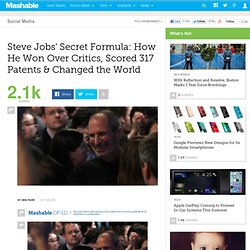
This wasn't any ordinary trip to One Infinite Loop. Steve Jobs was on stage, but he wasn't going to announce any products. Just two days earlier, Apple hastily called for a press conference to address the growing rumors and complaints surrounding the company's newest product, the iPhone 4. It was a terrible couple of weeks for Apple. You may remember it better as Antennagate. As I listened to Jobs speak about the antenna issues of other smartphones during his press conference at Apple Town Hall, it was clear he was far from nervous, panicked or upset. He took the whole controversy in stride. What I remember the most from that press conference was something he said. “We care about every user, and we’re not going to stop until every one of them is happy.”
I've also had the chance to chat with many people who have seen him work his magic in person. Steve Jobs: 1955 - 2011. Steven Paul Jobs, the co-founder and chairman of Apple, died Wednesday at the age of 56.
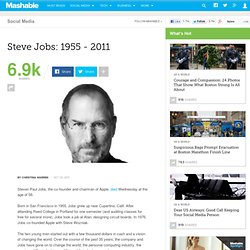
Born in San Francisco in 1955, Jobs grew up near Cupertino, Calif. After attending Reed College in Portland for one semester (and auditing classes for free for several more), Jobs took a job at Atari, designing circuit boards. In 1976, Jobs co-founded Apple with Steve Wozniak. The two young men started out with a few thousand dollars in cash and a vision of changing the world. Over the course of the past 35 years, the company and Jobs have gone on to change the world, the personal computing industry, the music and film industries and the mobile industry as we know. Apple released its first mass-market product, the Apple II in 1976. Brazenly introduced to the world in 1984 via a Super Bowl ad directed by Ridley Scott, the Macintosh helped set the standard for personal computing paradigms for the next decade. By the Way, What Have You Done That’s So Great?
By Jason Calacanis.
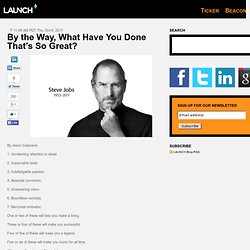
Steve Jobs has died. Steve Jobs, the co-founder of Apple, passed away today after a long battle with pancreatic cancer.
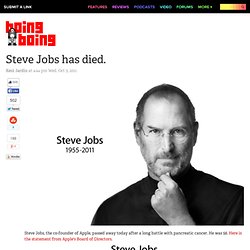
He was 56. Here is the statement from Apple's Board of Directors. Editorial note: For one day after we received this news, Boing Boing devoted its design to mimic the original Mac OS interface. Here we preserve an image of Boing Boing as it appeared at the time. Sign In. Steve Jobs, 1955 – 2011. It’s impossible to imagine the web as it is today without Steve Jobs in the story.
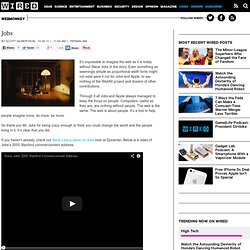
Even something as seemingly simple as proportional width fonts might not exist were it not for Jobs and Apple, to say nothing of the WebKit project and dozens of other contributions. Through it all Jobs and Apple always managed to keep the focus on people. What Made Steve Jobs So Great? [Apple's visionary co-founder, Steve Jobs, died yesterday.
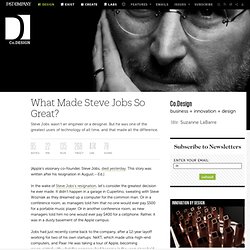
This story was written after his resignation in August. --Ed.] In the wake of Steve Jobs's resignation, let's consider the greatest decision he ever made. It didn't happen in a garage in Cupertino, sweating with Steve Wozniak as they dreamed up a computer for the common man. Or in a conference room, as managers told him that no one would ever pay $500 for a portable music player. Jobs had just recently come back to the company, after a 12-year layoff working for two of his own startups: NeXT, which made ultra-high-end computers, and Pixar. The Soul of Apple by Kevin Kelly.
This week something unusual happened.
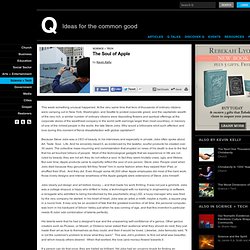
At the very same time that tens of thousands of ordinary citizens were camping out in New York, Washington, and Seattle to protest corporate greed, and the capitalistic wealth of the very rich, a similar number of ordinary citizens were depositing flowers and spiritual offerings at the corporate stores of the wealthiest company in the world (with earnings larger than most countries), in memory of one of the richest people in the world, the late Steve Jobs.
Why would a billionaire elicit such affection and love during this moment of fierce dissatisfaction with global capitalism? Because Steve Jobs was a CEO of beauty. In his interviews and especially in private, Jobs often spoke about Art. Taste. Jobs clearly put design and art before money -- and that made his work thrilling. His talents were that he had a designer's eye and the unwavering self-confidence of a genius. If a person can do that once, they are hailed as brilliant. But that is now. Memories Of Steve Jobs: Interviews & Inspiration. Here's how a typical press interview with Steve Jobs used to go in the early 2000s.
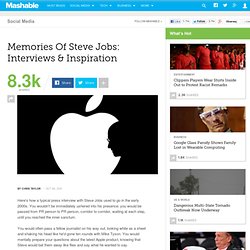
You wouldn't be immediately ushered into his presence; you would be passed from PR person to PR person, corridor to corridor, waiting at each step, until you reached the inner sanctum. You would often pass a fellow journalist on his way out, looking white as a sheet and shaking his head like he'd gone ten rounds with Mike Tyson. You would mentally prepare your questions about the latest Apple product, knowing that Steve would bat them away like flies and say what he wanted to say. And then there you were, with the man himself: black turtleneck, jeans, white trainers, spiky salt-and-pepper stubble, and those no-nonsense eyes that could look straight into your soul. You'd sputter out a question while he sipped from a bottle of Odwalla. If you could survive twenty minutes of this without cracking, his demeanor would soften.
Always Passionate. Steve Jobs's Biographer on "60 Minutes": The Highlights. Steve Jobs. Steve Jobs' Secret: How He Won Over Critics & Scored 317 Patents.